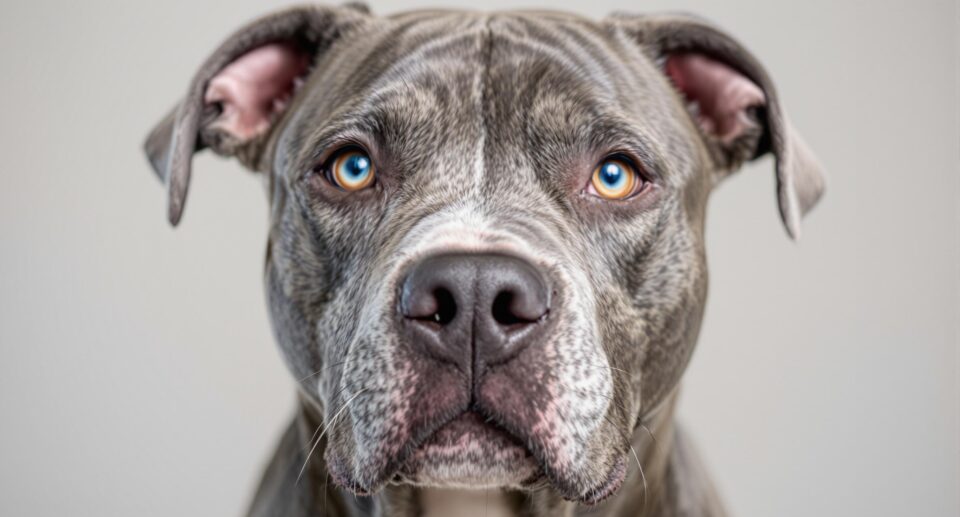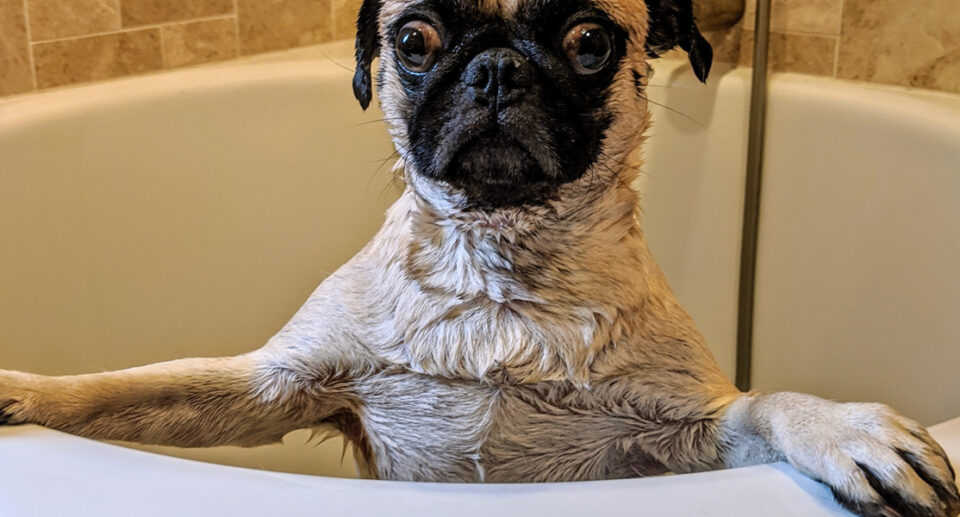
Happy National Pit Bull Awareness Day! In case you haven’t heard, pit bulls are celebrated with a day of their own at the end of October every year. Started in 2007 by Bless The Bullys rescue founder Jodi Preis, NPBAD is a day to learn about America’s favorite dog, fight the myths and stereotypes, and put a spotlight on dogs who are still waiting to find their forever home.
Whether you have a house hippo of your own or just want to learn more about one of the most popular pups in America, you’ll love our top ten fast facts about pit bulls.
1. The pit bull is not an official breed.
When people talk about “pit bulls,” they might mean the American Pitbull Terrier, but they’re usually referring to a bully breed mix (BBM), a dog with a squarish head, a smooth coat, and a stocky build. A dog that fits the pitbull “look” may be made up of one, two, or more breeds such as the American Staffordshire terrier, American Pitbull Terrier, Boxer, Staffordshire Bull Terrier, Bull Terrier, Bulldog, Dogo Argentino, or Cane Corso.
2. Pit bulls are masters of disguise.
DNA tests show that many dogs that are visually identified as pit bulls do not contain any trace of well-known bully breeds, and many dogs that look nothing like a “pit bull” may actually have bully breed genes. In fact, one study suggests that shelters may misidentify dogs up to 75% of the time. The only way to find a dog’s true breed makeup is with genetic testing like the at-home DNA My Dog Breed Test.
3. They’re America’s house hippo-paw-tomuses.
Pit bull lovers have dozens of affectionate names for their beloved dogs. Some of the most popular include velvet hippos, house hippos, blockheads, and pibbles. Of course, a velvet hippo wrapped in a blanket becomes a baked potato or a bully burrito.
Pit bulls bring “roses.”
The shape of a pitbull’s ears is referred to as “rosebud” shape because of the way they fold over and slightly curl at the edges, just like the petals of a rosebud before it begins to bloom.
Pit bulls come from Britain
In the British Isles in the 1800s, the Old English Bulldog and Old English Terrier were crossbred to combine their strength and athleticism to create the first bull terriers. By the 1890s, immigrants brought their English Bull Terriers over to the United States and created their own “American Pit Bull Terrier.”
A pit bull was our favorite Little Rascal
. The 1920’s-1940’s TV show “Little Rascals” co-starred Pete the Pup, an American Pit Bull Terrier whose real name was Pal the Wonderdog. The iconic ring around his eye was (mostly) real, though it was enhanced with hair dye to create a perfect circle. When he passed away, his son replaced him on the show. Since his son did not have the natural circle marking, the show makeup artists used eyeshadow to recreate his father’s iconic markings.
Pit bulls are prone to allergies.
Not such a fun fact, but good to know – pit bulls are known to be prone to developing allergies, which manifest as itchy skin and dandruff. Pit bulls with white coats are especially susceptible to allergy-related itching. Fortunately, allergies and food intolerances. and environmental allergies are treatable through diet and topical treatment like shampoos, itch relief spray, and skin and coat-building supplements.
Pit bulls are easy to groom.
With a short, single-layer coat, you won’t have to worry about excessive seasonal shedding or expensive trips to the groomer when you have a pit bull. Most pibble parents brush them once a week or so and ive bathe them once a month. Their short, sleek coat lacks an underlayer, so it dries quickly and does not shed as much as double-coated dogs, who blow their coat twice a year. Yes, pit bulls really are natural beauties!
Pit bulls have the best doggy smile.
It could be because of their broad muzzle, their bright, twinkly eyes, or their happy-go-lucky attitude. Whatever the reason, pit bulls have some of the best smiles you’ll ever see on a dog. In fact, a rescued pit bull in Fresno named Shortcake went viral and found her forever home because of her gorgeous grin.
Pit bulls need our help.
Pit bulls make up anywhere from 20-50% of dogs in shelters in the United States, and they’re also the most euthanized breed in shelters. Their high numbers in shelters are suspected to be due to a number of reasons, from breed restrictions in apartments, negative stereotypes, the popularity of the breed, and their tendency to be overbred by backyard breeders.
If you’re thinking about bringing home your very own velvet hippo, visit your local shelter or humane society today. If you don’t have room for another dog, you can always volunteer to walk, train, or play with local pibbles in need. And if you are lucky enough to share your home with a pit bull, give them an extra hug and kiss for us.





